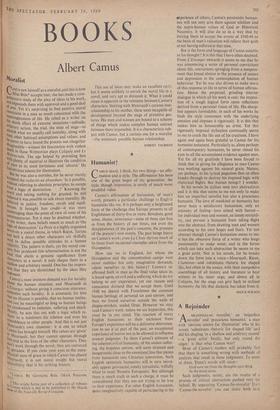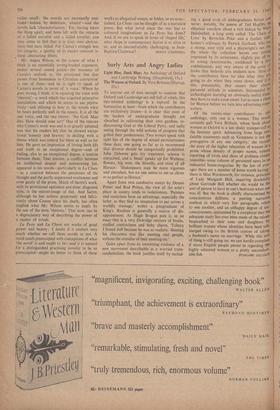A Rejoinder
A MEANINGLESS moralist,' an 'imperfect novelist' and 'precarious humanist,' a man with 'obvious talents for illustration' who in his novels 'substitutes rhetoric for shaped life' and did his shaping 'in a shallow and arbitrary mould' —a 'great artist' finally, but only round the edges : is that what Camus was?
Most of Camus's readers will probably feel that there is something wrong with methods of analysis that result in these judgments. To some of them, Yeats's words will occur:
God save me from the thoughts men think In the mind alone.
Such judgments, surely, are the results of a process of critical abstraction pushed very far indeed. By separating `Camus-the-moralise fro•it `Camus-the,novelise you can ffiake both look
rather small : the morals are necessarily con- fused—indeed, by definition, 'absurd'—and the novels lack 'characterisation.' Yet, having taken the thing apart, and been left with the remains of a failed moralist and a failed novelist, you may come to feel that it is your own abstrac- tions that have failed. For Camus's strength was his integrity, a quality of its nature resistant to these abstracting filters.
Mr. Angus Wilson, in the course of what I think is an essentially wrong-headed argument, makes several sound points—the nearness of Camus's outlook to 'the emotional line that passes from humanism to Christian conversion' is one of them—and he is right to speak of Camus's novels in terms of 'a voice.' Where he goes wrong, I think, is in equating the voice with `rhetoric'—a word which has acquired pejorative associations and which he seems to use pejora- tively—and refusing to hear in the novels what he hears perfectly well in the essays. It is all the one voice, and the one theme: 'No God. Man dies. How should man act?' One of the reasons why Camus's work was and is so greatly admired was that his readers felt that he showed excep- tional honesty and bravery in dealing with a theme which was central for them as well as for him. He gave an impression of loving both life and truth to an exceptional degree—and of feeling, also to an exceptional degree, a tension between them. That tension, a conflict between an intellectual despair and unreasoning joy. appeared in his novels—particularly in La Chute --as a contrast between the pessimism of the thought and the partly suppressed excitement and even gaiety of the prose. Much of Sartre's work, with its provisional optimism and dour, disgusted style, is the mirror-image of this. And Sartre, although he has written generously and felici- tously about Camus since his death, has often implied what Mr. Wilson seems to imply by the use of the term 'rhetoric.' That term can be a depreciatory way of describing the power of a master of words.
La Peste and La Chute are works of great power and beauty : I doubt if it matters very much whether we call them novels or not. A mind much preoccupied with conceptions of what 'the novel' is and ought to be--and it is natural for a distinguished practising novelist to be so preoccupied—might do better to think of these E works as allegorical essays, or fables, or sermons : indeed, La Chute can be thought of as a narrative poem. But what novel since the war has sl coloured imaginations as La Peste has done? And, if we are to speak in terms of 'shaped life,' what shape in contemporary fiction is so alive to us, and so uncomfortably challenging, as Jean- Baptiste Clamence? DONA r 0 DONNELL



































 Previous page
Previous page